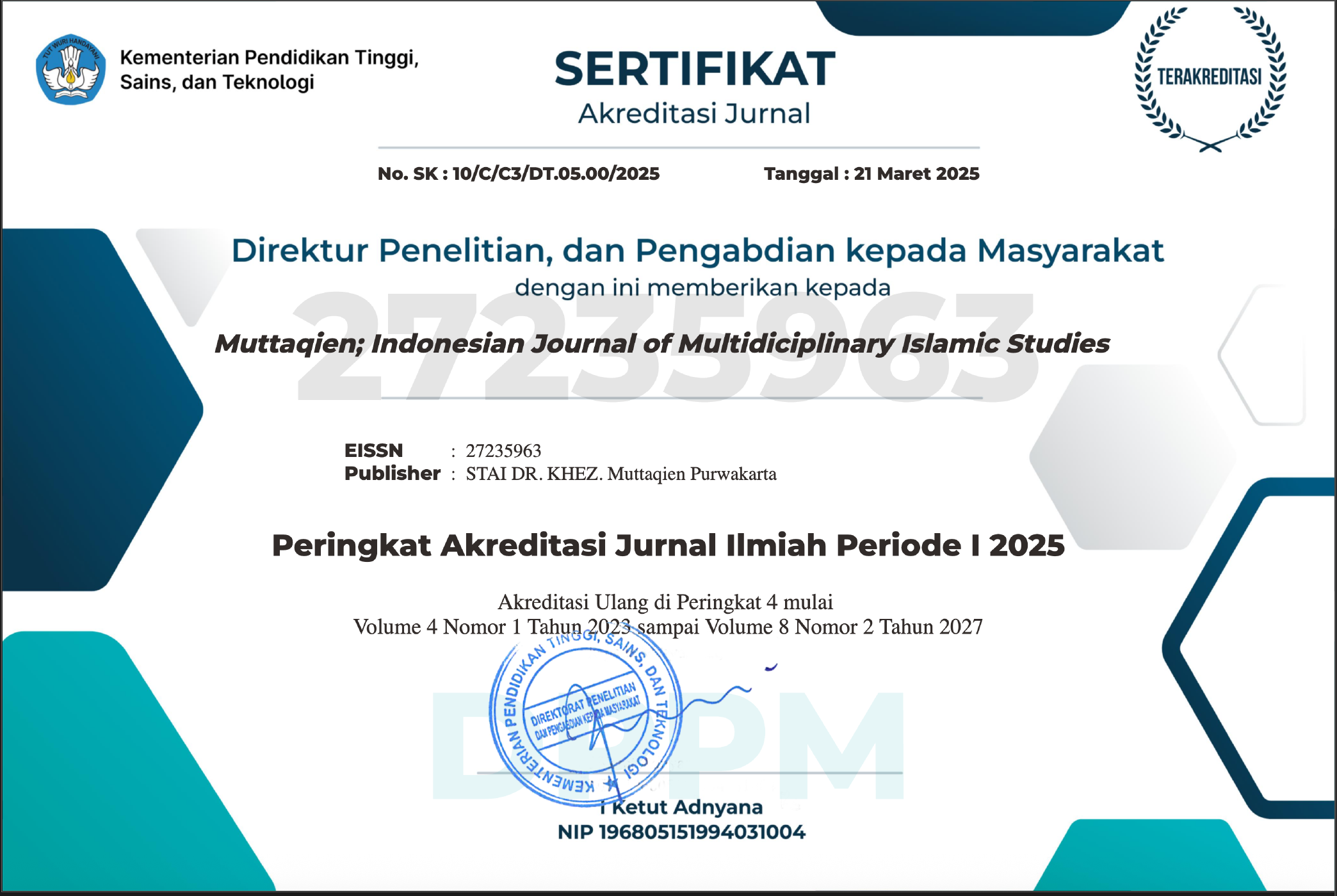Komodifikasi Dalil Agama di E-Commerce
Keywords:
Commercialization , E –Commerce , Sociology of ReligionAbstract
The use of Qur'anic verses as descriptions in sales has been widely practiced by producers, including in the Shopee application. This verse aims to lead the message visually and contains religious elements, so the correlation between images can attract Muslim consumers. This qualitative research seeks to explore the variety of uses of Qur'anic verses in commercialization in Shopee, describe the forms of reception of Qur'anic verses used in Shopee as a commercialization tool, and explain the factors for using Quranic verses as a commercialization tool. This type of research is a qualitative descriptive analysis with a Sociology of Religion approach and one of Peter L. Berger's theories, Social Construction. The research data comes from observations on shop accounts that use Qur'anic verses, translations, and hadith meanings as descriptions. The results showed five forms of commercialization, including Al-Qur'an verses in memes, Al-Qur'an verses in descriptions, Al-Qur'an verses and Hadith in descriptions, Hadith in descriptions, Hadith in descriptions, and Hadith in pictures and descriptions. The typology of reception in this study is included in the typology of functional reception because the Qur’an was created for humans to respond and direct to specific goals, which eventually gave birth to a motivation to change attitudes and ways of acting in everyday life. This happens because of 3 background factors: the externalization factor is the process of self-adjustment, the objectification factor is the result of self-adjustment, and the internalization factor is when producers and consumers I'd appreciate it if you could understand the meaning in the meme.
Â
References
Annafis, L. Al, Nawawi, A., & Ikhsan, F. A. (2022). Iklan Madu HNI di Instagram dalam Pasar Komodifikasi Islam. Syams: Jurnal Studi Keislaman, 3(1).
Berger, P. L., & Luckmann, T. (2018). Tafsir Sosial atas Kenyataan. LP3ES.
Dharma, F. A. (2018). Konstruksi Realitas Sosial: Pemikiran Peter L. Berger tentang Kenyataan Sosial. Kanal: Jurnal Ilmu Komunikasi. https://doi.org/10.21070/kanal.v
Haryanto, S. (2016). Sosiologi Agama: dari klasik hingga postmodern. Ar-Ruzz Media.
Kemenag. (2019). Al-Qur’an dan Terjemahnya. Lajnah Pentashihan Mushaf Al-Qur’an.
Khofifah, R. (2022). Pemanfaatan Marketplace Shopee sebagai Media Komunikasi Pemasaran Online Shop JR.id4.
Loekamto, A. (2012). Implementasi Technology Acceptance Model (Tam) Dalam online Shopping. Kajian Ilmiah Mahasiswa Manajemen.
Mutma’inah. (2018). Program Taḥfīẓ Al-Qur’Än dan Komersialisasi Pendidikan. Journal of Islamic Education Policy, 3(1). https://doi.org/10.30984/j.v3i1.856
Palupi, G. A. (2022). Shopee Masih Jadi E-Commerce Pilihan Utama Masyarakat Indonesia. Goodstats. https://goodstats.id/article/jakpat-shopee-masih-rajai-e-commerce-pilihan-masyarakat-indonesia-tahun-2022-scYdn
Pribadi, Y., & Gufron, Z. (2019). Komodifikasi Islam dalam Ekonomi Pasar: Studi tentang Muslim Perkotaan di Banten. Afkaruna. https://doi.org/10.18196/aiijis.2019.0096.82-112
Rafiq, A. (2004). Pembacaan yang Atomistik terhadap Al-Qur’an: Antara Penyimpangan dan Fungsi. Jurnal Studi Ilmu-Ilmu Al-Qur’an Dan Hadis, 5(1).
Rafiq, A. (2012). Sejarah Al-Qur’an: dari Pewahyuan ke Resepsi (Sebuah Pencarian Awal Metodologis). In Islam, Tradisi dan Peradaban. Bina Press Mulia.
Rafiq, A. (2014). The Reception of the Qur’an in Indonesia: A Case Study of the Place of the Qur’an in a Non-Arabic Speaking Community [Disertasi]. The Temple University Graduate Board.
Safira, D., & Fatriansyah, A. I. A. (2020). Bisnis Jual Beli Online Dalam Perspektif Islam. Al Yasini: Jurnal Hasil Kajian Dan Penelitian Dalam Bidang Keislaman Dan Pendidikan. https://doi.org/10.26618/j-hes.v3i1.2125
Saihu, M. (2021). Ekspresi Miliu Komersial Arab Makkah dalam Al- Quran. Mumtaz: Jurnal Studi Al-Qur’an Dan Keislaman.
Sutrismi, S. (2022). Analisis Transaksi Jual Beli Online Melalui Aplikasi Shopee Menurut Perspektif Ekonomi Islam.
Tianah, I. (2021). Sosiologi Agama untuk PTKI/PTKIN. Jejak Pustaka.
Widyanita, F. A. (2018). Analisis Pengaruh Kualitas Pelayanan E-Commerce Shopee terhadap Kepuasan Konsumen Shopee Indonesia pada Mahasiswa FE UII Pengguna Shopee. http://link.springer.com/10.1007/978-3-319-76887-8%0Ahttp://link.springer.com/10.1007/978-3-319-93594-2%0Ahttp://dx.doi.org/10.1016/B978-0-12-409517-5.00007-3%0Ahttp://dx.doi.org/10.1016/j.jff.2015.06.018%0Ahttp://dx.doi.org/10.1038/s41559-019-0877-3%0Aht
Effendi, M. R., Mushlihin, M., Aulia, R. N., Wajdi, F., Hani, U., & Risma, R. (2023). Pelatihan Mengkaji Tafsir Ayat-Ayat Keshalehan Sosial dalam Upaya Penguatan Karakter Masyarakat Muslim di Desa Cisaat Subang Jawa Barat. Satwika: Jurnal Pengabdian Kepada Masyarakat, 3(2), 119-125.
Effendi, M. R., Wajdi, F., Aulia, R. N., Hani, U., & Kholwa, A. (2023). Penguatan Program Muslim Friendly Tourism dalam Kegiatan Keagamaan Islam pada Masyarakat Desa Wisata Edukasi Cisaat. Sivitas: Jurnal Pengabdian dan Pemberdayaan Masyarakat, 3(2), 65-76.
Effendi, M. R., Wajdi, F., Mardhiah, I., & Darma, S. H. (2022, November). Strengthening the Values of Prophetic Theology in Religious Education Activities in the Cisaat Education Tourism Village Community. In ICHELSS: International Conference on Humanities, Education, Law, and Social Sciences (Vol. 2, No. 1, pp. 9-15).
Published
How to Cite
Issue
Section
Copyright (c) 2024 Andi Nur Ahyani, Muhammad Syahrul Mubarak, Abdul Gaffar, Nasri Akib

This work is licensed under a Creative Commons Attribution-ShareAlike 4.0 International License.
Muttaqien; Indonesian Journal of Multidiciplinary Islamic Studies allow the author(s) to hold the copyright without restrictions and allow the author(s) to retain publishing rights without restrictions and authors who publish with this journal agree to the following terms:
In developing strategy and setting priorities, Muttaqien; Indonesian Journal of Multidiciplinary Islamic Studies recognize that free access is better than priced access, libre access is better than free access, and libre under CC-BY-SA or the equivalent is better than libre under more restrictive open licenses. We should achieve what we can when we can. We should not delay achieving free in order to achieve libre, and we should not stop with free when we can achieve libre.
Muttaqien; Indonesian Journal of Multidiciplinary Islamic Studies has a CC-BY SA license or its equivalent as the optimal license for publication, distribution, use and reuse of scientific work. This license is under a Creative Commons Attribution 4.0 International License.
You are free to:
- Share — copy and redistribute the material in any medium or format
- Adapt — remix, transform, and build upon the material for any purpose, even commercially.
- The licensor cannot revoke these freedoms as long as you follow the license terms.










